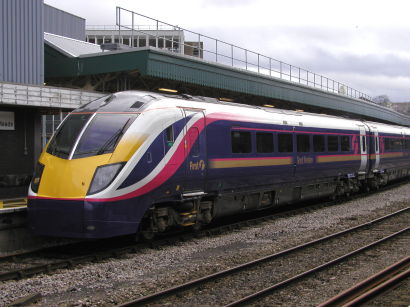ALSTOM-BUILT diesel trains which were rejected by First Great Western a few years ago because of reliability problems are returning to the west, as part of an increase in the size of the FGW fleet.
Class 180 five-car Adelantes were in service with FGW between 2001 and 2009, but then briefly became surplus before most of them were leased by two open access operators -- First Hull Trains and Grand Central.
However, five of the 14-strong fleet were to have been used by East Coast, but in a change of plan three of them have been sub-leased to Northern for a while.
As part of a further rolling stock shuffle, newly confirmed by the DfT and First Great Western, the five sets will now return to service in the west during the first six months of 2012, where they will be used to replace Turbo sets between London, Oxford and Worcester. The displaced Turbos will be used to strengthen FGW suburban services in the Thames Valley.
In other changes, FGW is gaining two three-car Class 150 diesel units for the Reading-Basingstoke line. Two more Class 150 vehicles will replace two single-coach Class 153s in the Bristol area, allowing the 153s to be moved to Devon and Cornwall. One will strengthen trains on the Barnstable-Exeter-Paignton/Exmouth lines, and the other will increase capacity on the Falmouth Docks branch, where trains have been overcrowded following the doubling of frequency to twice-hourly.
HSTs are also to be lengthened on the London to Bristol route, where seven-car sets are to be increased to eight by inserting former buffet cars. 15 of these are being converted by Wabtec into standard seated vehicles.
First Great Western has been coming under fire for overcrowding on various parts of its network, and FGW managing director Mark Hopwood said he was delighted.
"We’ve seen an ever increasing demand for travel on our services," he said.
"While that demand is gratifying in one respect, it can lead to overcrowding on peak services, which is why we’ve been working for some time to secure additional carriages.
"We have worked hard to put together an innovative deal that really maximises the benefit to customers from the rolling stock currently available. This investment – some £29 million – will deliver thousands of extra seats.
"I’m delighted we’ve been able to reach this deal with the Department for Transport, and I thank the Members of Parliament, local authorities and other key partners who supported our efforts."


